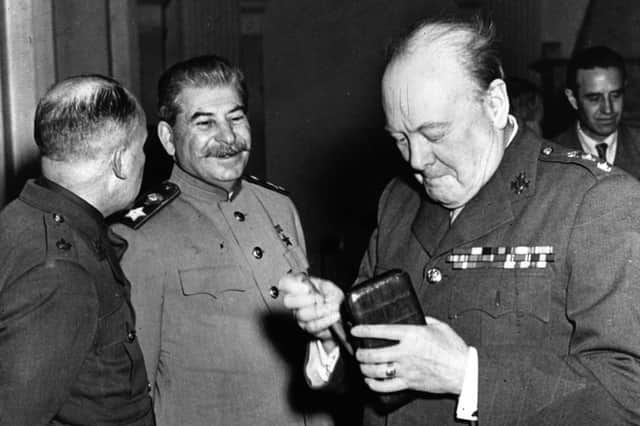Red Army’s ‘miracles of heroism’ (1941)


He said that the absence of a second front lightened considerably the task of the German armies and was responsible for the retreat of the Red Army.
Stalin disclosed that Germany had “several times” as many tanks as Russia, and he called for increased production of these as well as anti-tank weapons and dive-bombers.
Advertisement
Hide AdAdvertisement
Hide AdHe also revealed that Hess, “Nazi No 2”, had been sent to England to try and persuade Britain and the United States to join a coalition against Soviet Russia.
Stressing the importance of Anglo-US aid, which was “growing continually”, the Soviet leader said that it would be “the first decisive point against Fascism”.
During his speech Stalin said: “Our army is performing miracles of heroism, but the enemy does not stop. Counter-attacks by our armies are putting out of action again and again new and ever new units of his advance forces which replace those we have rendered unfit for action.”
Hitler’s miscalculations
Reflecting on the current position of the war the News Letter was happy to call Hitler out on his errors.
Advertisement
Hide AdAdvertisement
Hide AdThe newspaper declared: “When Hitler, anxious to put the coping-stone, as it were on the crazy edifice of his new Continental ‘Order’, decided to round upon Russia, he may or may not have under-estimated the military strength of that vast country, but in other directions his reckoning was badly at fault. He failed to allow for the patriotic spirit of the Russian people – a spirit which, after four long months of weary defensive warfare, shows now sign of flagging.”
The News Letter added: “Yesterday, in an address to the Moscow Soviet, Mr Stalin reminded him of this – and of other miscalculations.
“He expected to see Russia’s power of resistance collapse under the strain of internal convulsions after a few German victories. Instead, he has seen the whole population mobilising in support of the army, peasants and workers in city and town vying with one another in eagerness to strike a blow against the invader.”
Comment Guidelines
National World encourages reader discussion on our stories. User feedback, insights and back-and-forth exchanges add a rich layer of context to reporting. Please review our Community Guidelines before commenting.